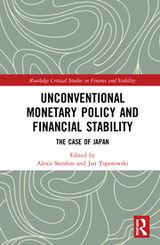
The effectiveness of unconventional monetary policy on Japanese bank lending
Montgomery, Heather / Ulrich VolzExternal Publications (2020)
in: Alexis Stenfors and Jan Toporowski (eds.), Unconventional monetary policy and financial stability: The Case of Japan, London and New York: Routledge, 2020, 38-53
ISBN: 978-0-36-714595-8
Information
This chapter analyzes the effectiveness of Japan’s bold experiment with unconventional monetary policy. Using a panel of bi-annual bank data covering the full universe of Japanese commercial banks over a fifteen-year period, this study analyzes the effectiveness of unconventional monetary policy – specifically QE – on the bank lending channel of monetary policy transmission. Our findings suggest that Japan’s unconventional monetary policy worked: there is a bank lending channel of monetary policy transmission in Japan. Our results are robust to the inclusion of time fixed effects and generalized method of moments analysis. However, contrary to the predictions of banking theory, the effects of QE seem to come mostly through undercapitalized banks. These findings suggest that bank balance sheet problems and regulatory pressure continue to be important factors impairing the credit channel.

